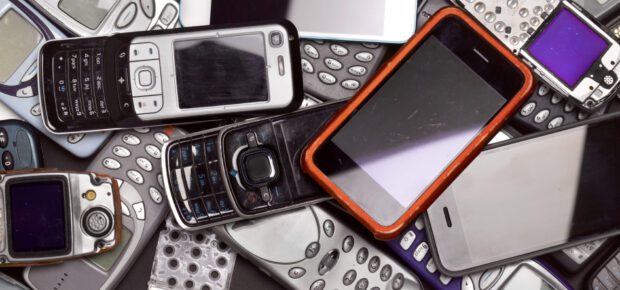August 6, 2021
Smartphones and other electronic devices are central to our lives. But when the battery won’t charge anymore, or the screen is cracked, or there’s a better and faster model available, where does that old phone go?
Discarded electronic devices can pose major environmental hazards. That’s because the precious (and not-so-precious) metals in them can enter waterways and soil after they are thrown away. Sometimes the old electronic devices are simply burned to dispose of them.
An initiative in Japan for the Olympic and Paralympic Games brought attention to the need to recycle electronic devices in a really interesting way.
Organizers collected old electronic devices – mostly smartphones – and recycled them to recover the gold, silver and bronze used for the Olympic medallions. The two-year initiative involved more than 90 percent of the municipalities in Japan, collecting more than 6.2 million cellphones and 78 tons of old monitors, computers and devices.
The yield for that massive effort? More than 66 pounds of gold, 9,000 pounds of silver and 5,900 pounds of bronze.
IEEE Impact Creator Tereza Carvalho, whose work focuses on green plastics and e-waste recently, spoke with Brazilian news site G1 about the amazing project.
“It’s a very small amount of gold and copper [in devices],” she said. “This volume has been gradually decreasing with the advancement of technology because metals are non-renewable resources. So, companies have been developing technology to make connections with the smallest possible quantities.”
Gold and silver each account for 0.3% of the weight of a printed circuit board. That means it takes an incredible number of devices to make a single medal. (And if you are wondering, the gold medals aren’t pure gold. The gold medal is approximately 1.2 pounds of silver with 0.2 ounces of gold plating.)
Across the globe, smartphones are nearly ubiquitous, and in several countries, there are more mobile phone subscriptions than people. Consumers around the world generated 53.6 million metric tons of e-waste in 2019, according to the UN Global E-Waste Monitor. Yet, just 17% of that waste was collected and recycled. The gold, silver, platinum and other precious metals that wasn’t recovered is estimated to be valued at more than US $57 billion.
E-waste recycling is sometimes referred to as urban mining because it reduces demand for traditionally mined ores that themselves pose environmental challenges. Carvalho sees enormous promise in urban mining, and its ability to support a sustainable, circular economy.
Carvalho said that, despite the minuscule metals content in devices, it’s still less expensive to recycle than to extract new precious metals from the ground.
“Practical experience has shown that it is more economical to extract the precious metals from electronic waste, such as old and post-consumer smartphones, than from a native mine,” Carvalho said. “In addition, precious metals are not renewable resources, so in the end, our choice will be to recover precious metals from used materials or to replace these metals with others with similar properties.”






 Meaningful Momentum or Running in Place?
Meaningful Momentum or Running in Place? AI Through Our Ages
AI Through Our Ages Liquid Infrastructure: Our Planet's Most Precious Resource
Liquid Infrastructure: Our Planet's Most Precious Resource The Impact of Technology in 2025
The Impact of Technology in 2025 Quantum and AI: Safeguards or Threats to Cybersecurity?
Quantum and AI: Safeguards or Threats to Cybersecurity? Why AI Can't Live Without Us
Why AI Can't Live Without Us Bits, Bytes, Buildings and Bridges: Digital-Driven Infrastructure
Bits, Bytes, Buildings and Bridges: Digital-Driven Infrastructure Impact of Technology in 2024
Impact of Technology in 2024 Emerging AI Cybersecurity Challenges and Solutions
Emerging AI Cybersecurity Challenges and Solutions The Skies are Unlimited
The Skies are Unlimited Smart Cities 2030: How Tech is Reshaping Urbanscapes
Smart Cities 2030: How Tech is Reshaping Urbanscapes Impact of Technology 2023
Impact of Technology 2023 Cybersecurity for Life-Changing Innovations
Cybersecurity for Life-Changing Innovations Smarter Wearables Healthier Life
Smarter Wearables Healthier Life Infrastructure In Motion
Infrastructure In Motion The Impact of Tech in 2022 and Beyond
The Impact of Tech in 2022 and Beyond Cybersecurity, Technology and Protecting Our World
Cybersecurity, Technology and Protecting Our World How Technology Helps us Understand Our Health and Wellness
How Technology Helps us Understand Our Health and Wellness The Resilience of Humanity
The Resilience of Humanity Harnessing and Sustaining our Natural Resources
Harnessing and Sustaining our Natural Resources Creating Healthy Spaces Through Technology
Creating Healthy Spaces Through Technology Exceptional Infrastructure Challenges, Technology and Humanity
Exceptional Infrastructure Challenges, Technology and Humanity The Global Impact of IEEE's 802 Standards
The Global Impact of IEEE's 802 Standards Scenes of our Cyber Lives: The Security Threats and Technology Solutions Protecting Us
Scenes of our Cyber Lives: The Security Threats and Technology Solutions Protecting Us How Millennial Parents are Embracing Health and Wellness Technologies for Their Generation Alpha Kids
How Millennial Parents are Embracing Health and Wellness Technologies for Their Generation Alpha Kids Space Exploration, Technology and Our Lives
Space Exploration, Technology and Our Lives Global Innovation and the Environment
Global Innovation and the Environment How Technology, Privacy and Security are Changing Each Other (And Us)
How Technology, Privacy and Security are Changing Each Other (And Us) Find us in booth 31506, LVCC South Hall 3 and experience the Technology Moon Walk
Find us in booth 31506, LVCC South Hall 3 and experience the Technology Moon Walk Virtual and Mixed Reality
Virtual and Mixed Reality How Robots are Improving our Health
How Robots are Improving our Health IEEE Experts and the Robots They are Teaching
IEEE Experts and the Robots They are Teaching See how millennial parents around the world see AI impacting the lives of their tech-infused offspring
See how millennial parents around the world see AI impacting the lives of their tech-infused offspring Take the journey from farm to table and learn how IoT will help us reach the rising demand for food production
Take the journey from farm to table and learn how IoT will help us reach the rising demand for food production Watch technical experts discuss the latest cyber threats
Watch technical experts discuss the latest cyber threats Explore how researchers, teachers, explorers, healthcare and medical professionals use immersive technologies
Explore how researchers, teachers, explorers, healthcare and medical professionals use immersive technologies Follow the timeline to see how Generation AI will be impacted by technology
Follow the timeline to see how Generation AI will be impacted by technology Learn how your IoT data can be used by experiencing a day in a connected life
Learn how your IoT data can be used by experiencing a day in a connected life Listen to technical experts discuss the biggest security threats today
Listen to technical experts discuss the biggest security threats today See how tech has influenced and evolved with the Games
See how tech has influenced and evolved with the Games Enter our virtual home to explore the IoT (Internet of Things) technologies
Enter our virtual home to explore the IoT (Internet of Things) technologies Explore an interactive map showcasing exciting innovations in robotics
Explore an interactive map showcasing exciting innovations in robotics Interactively explore A.I. in recent Hollywood movies
Interactively explore A.I. in recent Hollywood movies Get immersed in technologies that will improve patients' lives
Get immersed in technologies that will improve patients' lives